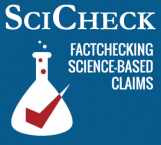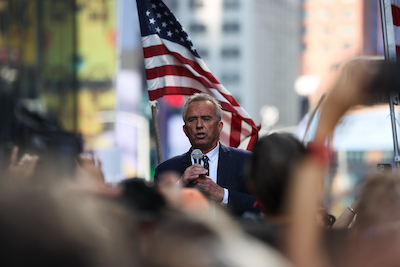By Kate Yandell
A recent video promoting independent presidential candidate Robert F. Kennedy Jr. promises to “start with some irrefutable facts.” The over 30-minute video, narrated by actor Woody Harrelson, begins with some biographical truths about the candidate, but veers into promoting various debunked or unsupported narratives about vaccines.

The pro-Kennedy super PAC American Values 2024 paid for the video, titled “Who is Bobby Kennedy?” Posts of the video have been viewed more than 100 million times on X, where Kennedy promoted it as “The Bobby Kennedy video Meta doesn’t want you to see.” Elon Musk, who owns X, shared Kennedy’s post.
Meta, which owns social media platforms including Instagram and Facebook, has said that a link to the video was “mistakenly blocked” temporarily after being incorrectly flagged as spam. The super PAC behind the video and Kennedy have both sued Meta, claiming election interference.
Kennedy has a history of spreading false or misleading information on vaccination, autism and COVID-19, among other topics. Below, we discuss a few of the claims made in the video that we previously addressed in a three-part series about Kennedy last year.
Debunked Claims on Vaccines and Mercury
According to the video, a pivotal moment in Kennedy’s career came when he met parents who believed that mercury in vaccines had harmed their children. The video doesn’t explicitly state how the parents believed the vaccines had injured their children, but Kennedy has said in the past mothers of autistic children brought the issue to his attention. A wide range of evidence indicates that there’s no link between thimerosal — a mercury-containing preservative — and autism or other conditions.
However, one parent provided Kennedy with scientific studies that convinced him, in his words, that “I got to drop everything and do something about this.” This led Kennedy to publish a 2005 article for Salon and Rolling Stone, which advanced the unsupported idea that thimerosal had caused an increase in autism and other disorders. Salon eventually retracted the story.
The Kennedy video doesn’t mention that extensive research has failed to show any relationship between thimerosal in childhood vaccines and neurodevelopmental disorders. In fact, the rate of autism continued to rise after thimerosal was removed from childhood vaccines in 2001, indicating that it did not explain the increase in diagnoses of the condition. This increase was likely caused in large part by growing awareness of autism, changes to how it is defined and the growing availability of services for children who get the diagnosis.
For more, read “What RFK Jr. Gets Wrong About Autism.”
Missing Facts on Vaccine Safety Testing and Manufacturer Liability
Kennedy goes on to state in the video: “Thanks to pressure from millions of people, they’ve taken mercury out of most vaccines, but pharmaceutical companies are still immune from prosecution and litigation, and vaccines aren’t subject to the same rigorous safety testing as other medicines, and that’s not right.”
Kennedy’s statement about the liability of vaccine makers needs context, and his claim about vaccine safety testing is misleading.
As we have written previously, the National Childhood Vaccine Injury Act of 1986 in many cases prevents people from suing vaccine makers for alleged vaccine harms. Instead, people must seek help from a government program.
If a compensation claim is rejected or it takes too long to get a response, people can still sue, and vaccine makers can still be held liable in certain situations, such as where negligence, fraud or manufacturing flaws led to vaccine injuries. Kennedy has himself been involved in an ongoing lawsuit against Merck on behalf of clients allegedly harmed by the human papillomavirus vaccine Gardasil.
The law was passed because lawsuits against vaccine makers — even those that turned out to be unjustified — were dampening companies’ enthusiasm for making vaccines. The law also led to the creation of the Vaccine Adverse Event Reporting System, a national surveillance system used by the Food and Drug Administration and Centers for Disease Control and Prevention to identify potential vaccine safety concerns. VAERS accepts unverified reports of any health issue that occurs after vaccination.
VAERS is just one part of a larger system that promotes vaccine safety in the U.S. Vaccines undergo testing for safety and efficacy before entering the market. As they are rolled out to the larger population, they undergo safety monitoring using systems such as VAERS and Vaccine Safety Datalink, which uses data from health care organizations across the country to monitor for possible connections between health events and vaccination.
It is unclear what exactly Kennedy means when he says that “vaccines aren’t subject to the same rigorous safety testing as other medicines.” We reached out to the Kennedy campaign for more information but have not received a reply.
Kennedy has previously falsely claimed that placebo-controlled trials are required for medications but not for vaccines. As we have said, vaccines are typically tested in controlled trials, but it is not feasible for all vaccines to be tested in placebo-controlled trials. For instance, if an effective vaccine is already available against a disease and researchers are testing a new version, it would be unethical to randomly assign some people to receive a placebo instead of an already available vaccine. For similar reasons, not all drugs are tested in placebo-controlled trials.
For more, read “FactChecking Robert F. Kenndy Jr.“
Revising the COVID-19 Narrative
A theme of the video is the idea that Kennedy has been unfairly criticized and attacked because he holds companies accountable. The video extends that argument to imply without evidence that attempts to hold Kennedy accountable for his statements on COVID-19 were in fact motivated by pharmaceutical companies.
“I feared that a rushed COVID vaccine wouldn’t be as safe or as effective as we were promised,” Kennedy says. “And I also felt that lockdowns were going to do more harm than good, especially to small businesses and to children. Well, when I made those arguments publicly I was silenced.”

This is a highly pared down account of Kennedy’s statements on COVID-19. Among many other unfounded claims, Kennedy has said that the COVID-19 vaccine was the “deadliest vaccine ever made,” and that “there is an argument” that COVID-19 is ethnically targeted. He has promoted disproven COVID-19 treatments and inflated the costs, while discounting the benefits, of COVID-19 restrictions.
The narrator, Harrelson, then outlines a conspiracy: “So powerful corporations and partners in the media have a playbook they use on you when you beat them too much and in areas you can cost them real money. They implemented every page in the playbook on Bobby when he decided to question the absolute moral purity of the gods of Big Pharma.” The video, meanwhile, shows logos of a collection of pharmaceutical companies, with Pfizer’s at the center.
Various media outlets over the years have published articles pointing out Kennedy’s misleading and false claims. The video visually highlights some of these articles, including ours, as part of a “playbook” in which they “attack you broadly and they question your facts.”
To be clear, the COVID-19 vaccines were rolled out rapidly — amid a deadly pandemic — because experts judged that the benefits outweighed the risks. Ample research has since affirmed that the vaccines protect against severe disease and that serious side effects are rare.
For more, read “RFK Jr.’s COVID-19 Deceptions.”
Editor’s note: SciCheck’s articles providing accurate health information and correcting health misinformation are made possible by a grant from the Robert Wood Johnson Foundation. The foundation has no control over FactCheck.org’s editorial decisions, and the views expressed in our articles do not necessarily reflect the views of the foundation.

